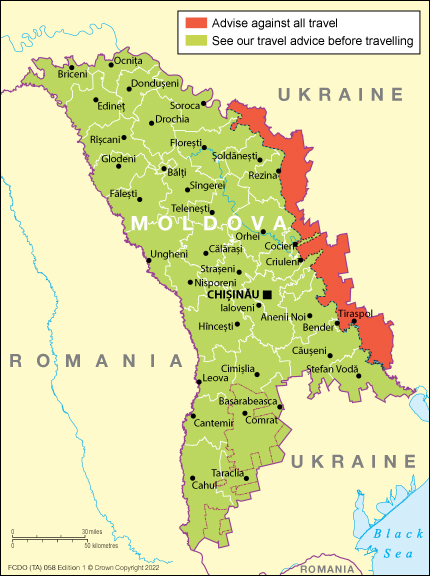Moldova
Summary

The FCDO advise against all travel to Transnistria
There is widespread military activity in Ukraine, including in areas close to some Moldovan borders. There have been a number of explosions reported in the Transnistria region in late April. Transnistria is outside the control of the Moldovan authorities. Our ability to offer consular support within this region is extremely limited, and in the event of military action on/near the border with Ukraine, would be further reduced. From 28 February, all checkpoints between Ukraine and the Transnistria region have temporarily closed. All other border crossings into Moldova remain open. See Safety and security
COVID-19 entry restrictions for Moldova
Before you travel, check the ‘Entry requirements’ section for Moldova’s current entry requirements. These may change with little warning. Monitor this advice for the latest updates and stay in contact with your travel provider.
Travelling from and returning to the UK
Check what you must do to travel abroad and return to England, Scotland, Wales or Northern Ireland.
If you plan to pass through another country to return to the UK, check the travel advice for the country you’re transiting.
The FCDO advises British nationals in Ukraine to leave immediately if they judge it is safe to do so. You should not attempt to cross into Ukraine from Moldova. See Safety and security
The UK is supporting the multilateral humanitarian effort, led by UNHCR, and also offering practical bilateral support. If you or your organisation are considering providing humanitarian support to Ukrainians in Moldova, check information on existing support and ways to assist further on GOV.UK and the official pages from the Moldovan Government (largely Romanian and Russian only). This is particularly important if you are considering bringing in humanitarian supplies (Romanian and Russian language only).
On 23 February 2022 Moldovan authorities declared a State of Emergency for a period of 60 days in light of regional crisis. This has now been extended until 20 June 2022. You should check with your airline provider before booking tickets and travelling and be aware that restrictions could be introduced at short notice.
If you enter Moldova from Ukraine, Border Police will permit you to cross the Ukrainian-Moldovan checkpoint with a national ID card or a birth certificate. If you are in Ukraine en route to Moldova, you should Register your presence as currently in Ukraine, ahead of arriving in Moldova.
If you are planning travel to Moldova, find out what you need to know about coronavirus there in the Coronavirus section.
During the COVID-19 pandemic, it is more important than ever to get travel insurance and check it provides sufficient cover. See the FCDO’s guidance on foreign travel insurance.
For information about COVID-19 vaccines, see the Coronavirus page.
Most visits to Moldova are trouble free. You should be alert to the possibility of protests and demonstrations. While these are generally peaceful, the situation could quickly change. If you are in Moldova, keep up to date with developments and take extra care. You should avoid large crowds, remain vigilant and follow the advice of local authorities.
The Moldovan authorities strictly enforce penalties (including deportation) against those who overstay. See Entry requirements
You should be vigilant to petty crime, particularly in Chisinau. Leave your passport, travel documents and other valuable items in a safe place, and carry a photocopy of your passport for identification purposes. See Crime
There are strong penalties for possession or use of drugs. Avoid taking photographs of military or government installations. See Local laws and customs
Although there’s no recent history of terrorism in Moldova, attacks cannot be ruled out. See Terrorism
If you’re abroad and you need emergency help from the UK government, contact the nearest British embassy, consulate or high commission.